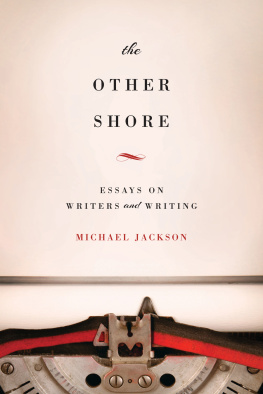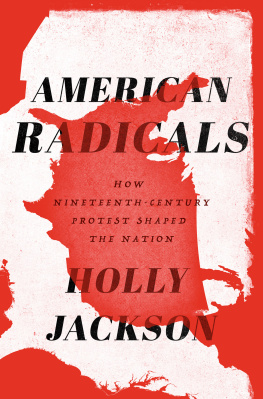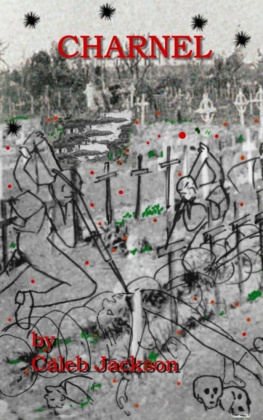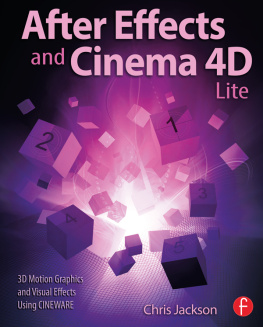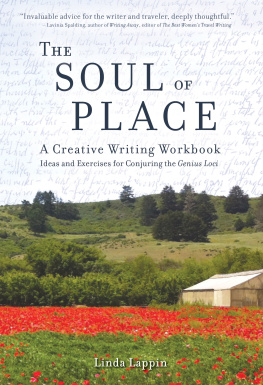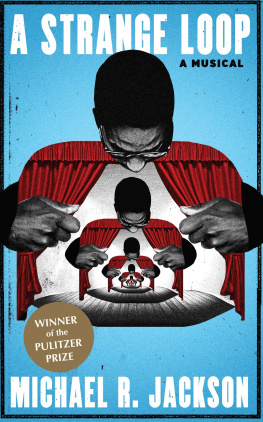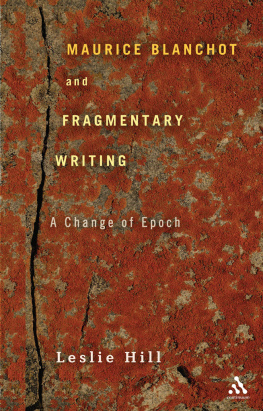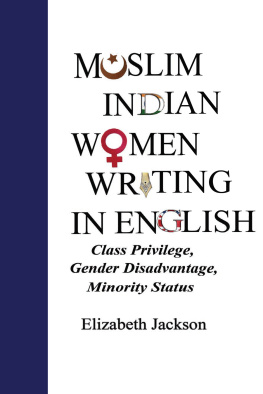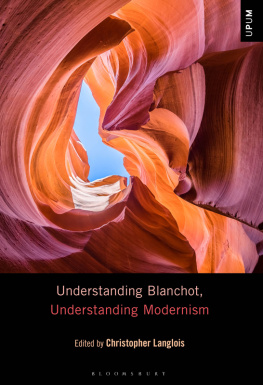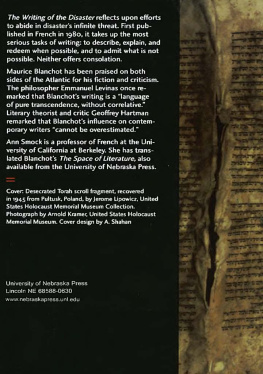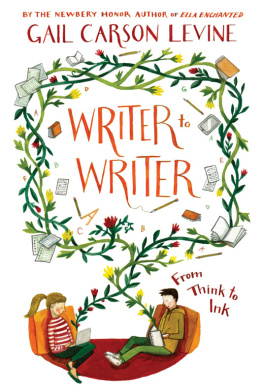
The Other Shore
The Other Shore
ESSAYS ON WRITERS AND WRITING
Michael Jackson

UNIVERSITY OF CALIFORNIA PRESS
BERKELEYLOS ANGELESLONDON
University of California Press, one of the most distinguished university presses in the United States, enriches lives around the world by advancing scholarship in the humanities, social sciences, and natural sciences. Its activities are supported by the UC Press Foundation and by philanthropic contributions from individuals and institutions. For more information, visit www.ucpress.edu.
University of California Press
Berkeley and Los Angeles, California
University of California Press, Ltd.
London, England
2013 by The Regents of the University of California
Library of Congress Cataloging-in-Publication Data
Jackson, Michael, 1940
The other shore : essays on writers and writing / Michael Jackson.
p. cm.
Includes bibliographical references.
ISBN 978-0-520-27524-9 (cloth : acid-free paper)
ISBN 978-0-520-27526-3 (pbk. : acid-free paper)
eISBN: 9780520954823
1. American fiction20th centuryHistory and criticism. 2. English literatureHistory and criticism. 3. English languageWriting. 4. Authorship. I. Title.
PS379.J23 2012
813.509dc232012030150
Manufactured in the United States of America
22 21 20 19 18 17 16 15 14 13
10 9 8 7 6 5 4 3 2 1
In keeping with a commitment to support environmentally responsible and sustainable printing practices, UC Press has printed this book on 50-pound Enterprise, a 30% post-consumer-waste, recycled, deinked fiber that is processed chlorine-free. It is acid-free and meets all ANSI/NISO (Z 39.48) requirements.
Man is that which is incomplete, although he may be complete in his very incompletion; and therefore he makes poems, images in which he realizes and completes himself without ever completing himself completely.
OCTAVIO PAZ
The Bow and the Lyre
To be alive and to be a writer is enough.
KATHERINE MANSFIELD
Journal
Even in a personal sense, after all, art is an intensified life.
Thomas Mann
Death in Venice
All that we do
Is touched with ocean, yet we remain
On the shore of what we know.
RICHARD WILBUR
For Dudley
CONTENTS
PREFACE
I considered myself a writer long before I completed a volume of poetry, wrote a novel, or published an anthropological monograph. Writing, for me, was a way of life. As for the origins of this calling, I suspect that it was a longing to connect with places, people, and periods of history that lay beyond the provincial town in which I came of age. Fascinated by exotic worlds, I saw writing as my means of transport and escape. Writing, I came to realize, was a techn,
In the half century since my first book appeared,bearing witness to what we learn of life, struggling to express it adequately, and comparing our findings with the findings of others.
Yet ours is, undeniably, an information society. We move about with our heads in clouds of data. E-mail, Skype, Facebook, and LinkedIn keep us in touch with scattered friends, family, colleagues, and collaborators. We cross streets with cell phones pressed to our ears, or stand on the sidewalk using earphones and microphone to talk unselfconsciously to an invisible other,
The shock of the new leads us to confuse means and ends. We assume that a technology of communication actually determines the character of what is communicated. The medium is the message. Yet, before the digital revolution there was always more than met the eyesubliminal signals, nonverbal nuances, ambiguities, unspoken intentions. There was always a cloud of unknowing in the ether that surrounded us and obscured the space between us. There was always a gap between a speaker and his or her interlocutor. The monk hesitated over his manuscript as the student now panics at the sight of a blank page. Some small betrayal was implicated in every attempt to speak ones mind, recount an event, or faithfully pass on a piece of news. Convinced that history is marked by radical discontinuities, one worldview giving ground to another, we fall into thinking that every new invention fundamentally alters our lives when, in fact, it may simply enable old goals to be met in new ways. Is a story written with a quill pen basically different from a story written on a typewriter or word processor? Is the life of a reader so very different from the life of someone listening to an oral tale? Did literacy bring about the atrophy of face-to-face social life? Does text messaging diminish the quality of a teenagers life? In this book, I am interested in the rite in writing. My argument is that writing is like any other technology of self-expression and social communication, and that in exploring the lifeworlds of writing and writers we discover the same existential imperatives that have always preoccupied human beings, regardless of their cultural or historical circumstancesthe need to belong to lifeworlds wider than their own, to feel that they can act on the world rather than merely suffer its actions upon them, and to express what seems peculiar and problematic about their own experiences in ways that resonate with the experiences of others.
ONE
The Other Shore
WALTER BENJAMIN ONCE OBSERVED THAT our human gift for seeing resemblances is nothing other than a rudiment of the powerful compulsion... to become and behave like someone else. Anyone who lectures for a living will recognize this experience. No matter how painstakingly one prepares a talk, it will draw comments that bear no relationship to what one thought one was saying and attract questions that preclude any response.
But lecture halls and classrooms arent the only places where we pass each other like ships in the night, and should an alien anthropologist visit earth he or she would undoubtedly be struck by our extraordinary capacity for talking past each other and not catching each others drift. At the same time, our imaginary anthropologist would surely be baffled by the different meanings that attach to the same gestures in different culturesa nod signaling negation in Greece but affirmation in England, direct eye contact conveying sincerity of interest in America but antagonism in Polynesia and Africa, touching taken as an unwanted invasion of a persons private space in some societies but in others communicating empathy. Not only would our alien anthropologist wonder at the mutual misunderstanding and downright misery that spring from the inherent ambiguity of everything human beings say and do in the presence of one another, he or she would also be astonished by the energy devoted to reducing this ambiguity and dealing with the fallout from never knowing exactly what others are feeling, thinking, or intending.
If our alien strayed into a university, he or she might be amazed at the industry generated by the passion for rational, systematic, unambiguous knowledge of others and of ourselves, and he or she might wonder how human beings have managed to succeed in the Darwinian struggle for survival, given their Babel of mutually incomprehensible languages, dialectics, and argots, not to mention their capacity for misreading one anothers gestures and minds. But our visiting ethnographer might ask a more fundamental question: Why would well-educated earthlings set such store by the idea of knowing the other, or knowing themselves, when social existence is manifestly not predicated upon theoretical understanding, any more than meaningful speech is predicated upon a formal knowledge of grammar. Indeed, theories, like prejudices, would seem to be one of the principal causes of misrecognition, since they tend to make the other an object whose only value is to confirm our suspicions or prove our point of view. As long as mutually congenial outcomes occur, our alien anthropologist might argue, it does not matter whether one begins, or ends, with a clear understanding of what one is doing, an empathic understanding of the other, or even knowledge of oneself.
Next page
